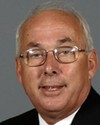Madam Speaker, thank you for the opportunity to speak on this topic. Through you, Madam Speaker, I want to speak to the people of Newfoundland and Labrador.
This is an opportunity for the people of our province to benefit from the offshore oil resources that they have been wanting since the Atlantic accord was signed in 1987. The accord stated that Newfoundland and Labrador should be the main beneficiary. However, an offset mechanism was put in the Atlantic accord that allowed Newfoundland and Labrador to receive only 30% outside of the equalization formula.
What I have done, as the Minister of Natural Resources responsible for the Atlantic accord, is to follow through on the Prime Minister's commitment to allow Newfoundland and Labrador to receive 100% of the offshore oil resources outside of the equalization formula. In other words, the provincial revenues, including the corporate taxes, other taxes, other fees and royalties would go to Newfoundland and Labrador with no clawback on equalization. That commitment was made by the Prime Minister to the people of Newfoundland and Labrador. That would determine the 100% revenues go to the province.
There has to be a threshold set. The equalization formula that all Canada benefits from, outside of Ontario and Alberta, has been enshrined in the equalization policy. It helps those provinces that cannot help themselves through theirs revenues to equal that standard set across Canada.
The equalization formula under which Newfoundland and Labrador has benefited from for so many years is now giving the province of Newfoundland and Labrador an opportunity to become self-sufficient. The Prime Minister of this country made a commitment to the people. The Prime Minister of this country has and is keeping his word and will keep his word.
Let me go very quickly to the issue here. First, since the Atlantic accord started and since the oil started coming out of Hibernia and then Terra Nova, Newfoundland and Labrador has received 100% of the provincial revenues. In the Atlantic accord there was an offset mechanism where 30% of that was not taken back on equalization. That is there and that will stay.
In the other offset there was 70¢ that would be clawed back. For the first five years, from 1999 to 2003, 7% was taken back. From 2004 to 2011, it would be a declining formula where at the end of 2011 we would lose the full 70¢. We have reopened that accord with seven years left. The government has said to the province of Newfoundland and Labrador that it will now pay the province an offset mechanism equal to 100%.
In other words, the province still will receive all the revenues and it still will receive all the equalization. Then the province can keep that 30% that was written in the Atlantic accord with no clawback. On top of the 30%, the federal government will pay that 70¢ to the dollar. This is what Newfoundland and Labrador has wanted for so many years.
At the same time the province has all of that, hopefully, we will see more oil, gas, income and revenues for Newfoundland. That revenue will keep increasing, even with the debt mechanism. Let us keep our fingers crossed that this happens. All of Newfoundland, and my colleague opposite and myself are Newfoundlanders and Labradorians, we want to see that happen. However, once the province gets above the threshold of Ontario, the province will start losing equalization on top of all of that.
The thing we must keep in mind is the province will receive all of that while it is still receives the revenues.
Let it be clear. Newfoundland and Labrador will still receive the revenues even above the Ontario threshold. The revenues will keep coming the same as Ontario and Alberta. We will become a self-sufficient province, what every Newfoundlander and Labradorian wants.





